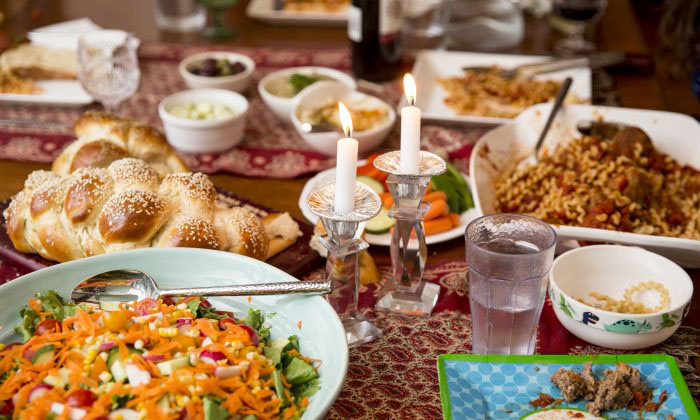
ANNIE WU
SOUTH ORANGE, N.J.—Her voice sang clearly across the room, warm and sweet.
Shabbat is centered around the family, a celebration of bonds between loved ones, a time to cherish each other’s company.
The tradition commences with a meal every Friday evening. Each member of the household plays a role. Shannon Sarna, the mother, nourishes the family with sustaining food.
Sarna and her husband take turns singing a prayer, then sip from the same wine chalice. They softly utter blessings to their two young children. After planting a kiss on top of their heads, the breaking of bread begins.
The dishes on the dinner table are an eclectic mix of Italian and Jewish influences: challah bread infused with garlic and rosemary, pasta with meatballs, an Eastern European cucumber salad, and hummus sprinkled with za’atar.
Sarna is a food blogger who documents her experiments with Jewish cuisine online. She also recently released a cookbook with her takes on traditional Jewish pastries, “Modern Jewish Baker: Challah, Babka, Bagels, and More.”
ALL PHOTOS BY SAMIRA BOUAOU/THE EPOCH TIMES

Shannon Sarna’s Shabbat dinner includes Jewish staples like challah and recipes passed down from her mother, such as pasta and meatballs and a big Italian salad with seasonal greens.
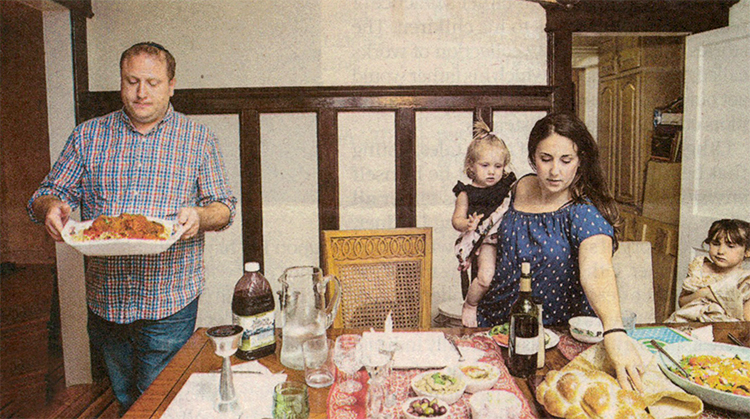
The family sits down for a home-cooked feast every Friday evening.
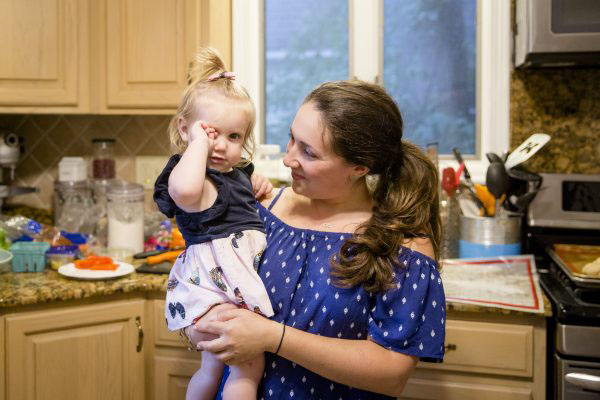
Sarna tends to her daughter Billie.
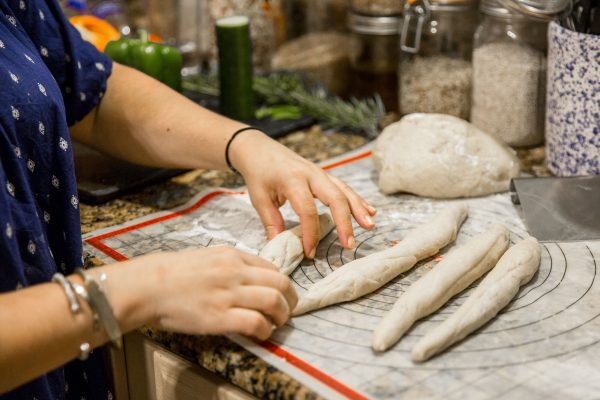
Shaping the challah dough.
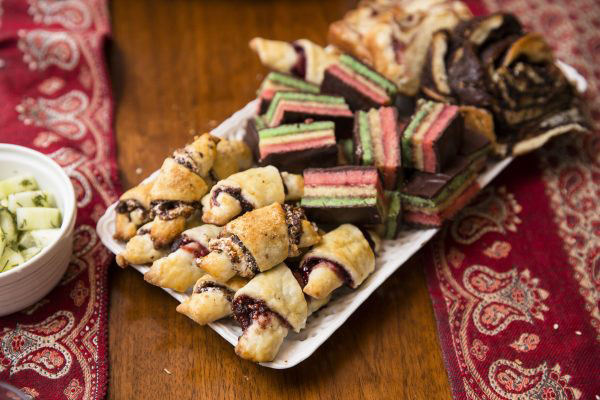
Rugelach, Italian cookies, and babka for dessert.
But Sarna didn’t grow up with Jewish cooking at home. Her Italian mother made Sunday suppers and weeknight dinners with a spread of Italian-American dishes like eggplant parm, red sauce pastas, and antipasti.
“It was very important that the TV was off. Nobody was on their cellphones, scrolling through Facebook. It was really a time to sit and eat as a family, and talk and be silly also. My dad would look for ways to tease us and drive us crazy,” she said.
Her father’s side of the family was Jewish, but the food did not appeal to her. “Grandma wasn’t a good cook,” Sarna said with a bashful smile. During the Jewish holidays, her grandmother would prepare a feast with dishes from Ashkenazi Jewish cuisine. But they didn’t taste right to her.
It was only after meeting Jonathan Goldberg, now her husband, that she understood the culinary possibilities in Ashkenazi dishes. Jonathan showed her his family recipes passed down from his grandmother, who was an excellent cook. Among her specialties was a most satisfying potato kugel, crispy and baked to golden perfection. Sarna wrote out the recipe with the help of her husband and published it on a popular Jewish cooking blog.
“Baba Billie loved to cook, really loved feeding people. Her legacy could live on through the recipe. which other people all over the world will make now,” she said.
Every Friday, Sarna takes the day off to get Shabbat dinner ready.
It can be chaos in the kitchen with Sarna’s two young daughters in tow. Ella, who calls herself the Shabbat princess, twirls around in her poofy dress. She shows off the songs she’s learned, while little Billie—named after Grand-ma Billie—in baby talk, demands food.
After being denied sampling the homemade rugelach, babka, and Italian rainbow cookies lying on the table, Billie begins to whine. Sarna plucks her from the floor and puts her into a high chair for a pre-dinner snack.
Eventually, Sarna is carrying Billie in one arm while tending to the challah baking in the oven and the big pot of boiling water for the pasta. Ella wanders into the kitchen, curious to see what is going on. In the living room, Otis and Babka, two stately black labrador mixes, perk up at the sound of lightning and start barking loudly.
Sarna manages to quiet the dogs and direct traffic, summoning everyone to the dining room—including Otis, who settles underneath the table. After prayers, Ella and Billie dig into their pasta, tossed in with those gratifying meatballs Sarna learned to make from her late mother—modified to be kosher—friendly by soaking the breadcrumbs in water instead of milk. Sarna and her husband discuss the minutiae of family life: plans for Ella to visit her grandparents, the eggplants that Jonathan recently grilled but Sarna didn’t like. She salvaged them by making baba ganoush for the table: mashed eggplant with parsley, lemon, and tahini.
After Ella is finished with her plate, Billie wanders to her spot, nibbling on the leftovers. She gets tomato sauce all over her face, prompting laughs from everyone.
All are satiated. Sarna is exhausted. Ella says she can’t wait to stay up a little later tonight: the whole family will watch a movie in bed. It’s a ritual that Jonathan and his family observed' when he was a young boy.
The routine will repeat itself again next week, and the week after that—Sarna’s own family tradition.
@EpochTaste
When I first started experimenting with challah varieties, rosemary and garlic was one of the first flavor combinations I tried, a nod to my dual Italian-Jewish heritage. The rosemary and coarse sea salt on top is not only delicious, but the combination produces a strikingly beautiful, but simple, challah. You don’t have to use fresh rosemary—it is just as beautiful if you use dried rosemary.
MAKES 2 MEDIUM LOAVES
For the Dough
1½ tablespoons dry active yeast
½ cup plus 2 tablespoons plus ½ teaspoon sugar
1¼ cups lukewarm water
4½-5 cups unbleached bread flour (preferably King Arthur)
1 ½ teaspoons table salt
¼ cup vegetable oil
2 tablespoons dried rosemary
1 tablespoon jarred minced garlic in oil
2 large eggs
For the dough: In a small bowl, place the yeast, ½ teaspoon sugar, and lukewarm water. Stir gently to mix. Allow to sit 5 to 10 minutes, until it becomes foamy on top.
In a large bowl or stand mixer fitted with the whisk attachment, mix together 1½ cups of the flour, salt, and ½ cup plus 2 tablespoons sugar. Add the water-yeast mixture, oil, dried rosemary, and minced garlic to flour. Mix thoroughly.
Add another 1 cup of the flour and 2 eggs and mix until smooth. Switch to the dough hook attachment if you are using a stand mixer.
Add another 1½ to 2 cups of flour, mix and place on a floured surface. Knead the remaining ½ cup flour into dough, continuing to knead for about 5 minutes.
Place dough in a greased bowl and cover with a damp towel. Allow to rise at least 3 hours.
Divide the dough in two and braid the challahs into desired shape.
Place braided challah on a baking sheet lined with parchment paper or silicone baking mat.
Allow the challah to rise another 45 to 60 minutes, or until you can see the size has grown and the challah seems light. This step is very important to ensure a light and fluffy challah. Preheat oven to 375 degrees F while the dough rises.
For the Topping
2 egg yolks (or 1 whole egg)
1 teaspoon water
1 teaspoon dried rosemary or 3-4 fresh rosemary sprigs
½ teaspoon minced, dried garlic flakes
¼ teaspoon coarse sea salt
For the topping: In a small bowl beat 2 egg yolks with 1 teaspoon water. Brush the egg wash liberally over the challah. Sprinkle with the additional dried rosemary, minced garlic flakes, and coarse sea salt. If using whole fresh rosemary sprigs, run them under cold water briefly and pat dry gently. For a particularly artful presentation, place the whole rosemary sprigs on top of the glazed challah.
Bake 24 to 26 minutes, or until the color is golden.
Reprinted with permission from “Modern Jewish Baker: Challah, Babka, Bagels, am More” by Shannon Sarna. Copyright 201; Published by Countryman Press.